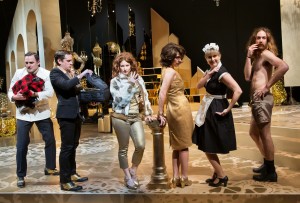HEY AMERICA! STOP HITTING YOURSELF
Stop Hitting Yourself
Rude Mechs
Zellerbach Playhouse
November 19–22, 2015
A review by Christopher Bernard
Cal Performances brought Austin, Texas’s zany theater collective Rude Mechs to Berkeley for a weekend of their 2014 New York hit. And a hit it was, hitting me, at first silly, then awake, with its brainy provocations, savage wit, and the cruel tickle of truth.
The show is an inspired combination of a classic Hollywood musical, a pithy allegory on contemporary mores, sudden outbreaks of wacked-out dance routines, witty seductions into audience participation, moments of unexpected confessions by the cast, and a fable on the inner conflict, at the heart of American life, between today’s brutal culture of narcissism, rapacity and greed and ancient ideals of selfless love, kindness to neighbors, the sanctity of nature and the basic decency of the common man and woman.
The Queen (Paul Spoileau in one of two stand-out roles), a bejeweled crone puttering about onstage on a diamond-studded biddy-mobile, each year hosts the Queen’s Annual Charity Retreat, during which she holds a contest for whom she will give out charity that year; thus paying obsequies to the gods of caritas and cut-throat competition in a single, self-regarding rite.
This year there are two contestants: a self-glamorizing Prince (a fine Joey Hood) from a disputed royal family, who will probably use his proceeds to continue his career of self-glorification, up to the throne and beyond, and the Wildman (a magnetic Thomas Graves; note the Christ-like beard and leonine mane, to say nothing of his first, and last, appearance in a white loin cloth looking fresh from the laundromats of Golgotha), who represents both a vulnerable nature at risk from man’s self-destructive self-centeredness, and an entreaty to love and care for all of our fellow creatures.
The Wildman’s sponsor at the contest is one of the glitzier members of the liberal “hypocracy”: a Socialite (the glamorous comedienne Lana Lesley) who wants to keep her conscience and her Lexus too, and tries to co-opt the Wildman by making him salonfaeisch, à la another musical, My Fair Lady, and succeeds so well he almost forgets what he’s there for.
The show climaxes with a death duel between Wildman and Prince as the Queen decides to base her decision on a good old medieval technique of justice: trial by combat. And the Prince and Wildman and their various minions and sponsors (including the rest of a first-rate cast: Heather Hanna, Hannah Kenah and E. Jason Liebrecht) go at it in a blaze of Three Stooge–like glory.
The show is technically a joy. One of its most entertaining effects was asking the audience close its eyes for a brief count as the cast scrambled to take various frozen tableaux: this paid off handsomely during the final battle scene. There is also a skillful use of stylized movement and blithely loco dance numbers, a fabulously gaudy stage set where a dollar sign blinks as grotesquely as the diamond pin on Ayn Rand’s black dress, and a gold-plated fountain of chili con queso (“You can always tell the rich by their bad taste” is one of many delicious, brain-teaser quotes from the show) dominating center stage (FYI: a recipe is provided in the program).
The music is pastiche-clever; the lyrics smart as a whip. The program notes that the show’s original basis was a reading of Rand’s Anthem, and the show tries not to be too blatantly critical of the more dubious elements of the ineffable Russian-American’s creed, but suggests there is a good deal more to them than their notorious weak points and Rand’s often indefensible conclusions. At one point the Queen herself admits, proudly, to having read The Fountainhead with pleasure “when I was 17 or 18.”
(Queenie, you don’t have to apologize to me. Full disclosure: I read The Fountainhead for the first time, recently, and I found it (1) hugely entertaining, (2) deeply provocative (i.e., it made me examine many of my own assumptions), and (3) profoundly stimulating (i.e., it changed my mind about not a few things); in fact it was a good bit smarter than I was expecting. And yet, even then, toward the end of the book, the author seems to go off the deep end, takes a handful of perfectly good ideas, and comes very near to … But read it if you haven’t (especially if you haven’t; consider this a homework assignment) and be surprised at how good some, if not all, of the “despicable” Rand’s ideas actually are. Much of the time she sounds like a classic liberal. And you might be shocked when you realize that one of the book’s villains is—a capitalist! As I said: read it, then we can talk.)
But back to our subject: The heart of Rude Mechs’ entertaining, provocative, and inspired show is an attempt to get the audience to think honestly about its theme—which is the necessity to combine the values of self-determination and respect for others, of individualism and charity, belief and doubt, improvement and conservation, nature and humanity—otherwise we may lose, and, truly, we may deserve to lose, everything.
The Wildman dies at the end of the performance.
But he is always reborn at the beginning of the next show.
_____
Christopher Bernard is author of the recently published collection, Dangerous Stories for Boys. He is co-editor of the webzine Caveat Lector. His new novel, Voyage to a Phantom City, will be published in February 2016.

